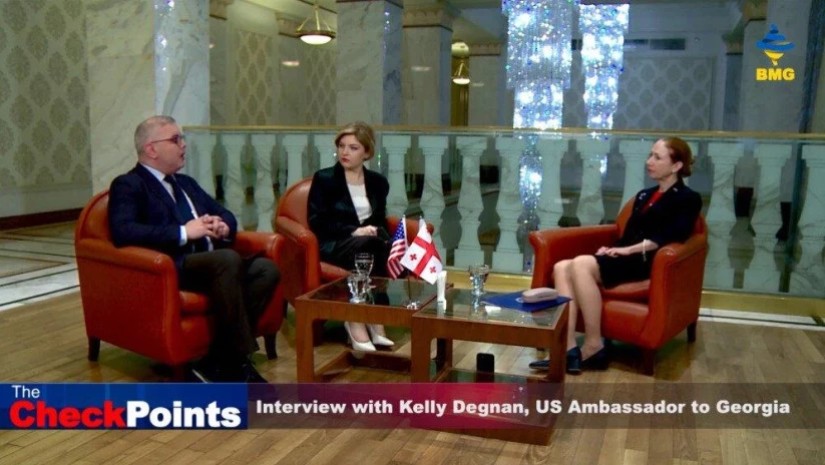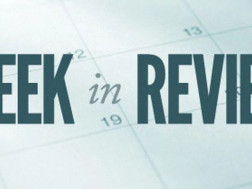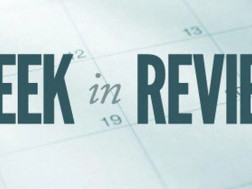The US Senate has confirmed by voice vote the nomination of Robin Dunnigan as US Ambassador Extraordinary and Plenipotentiary to Georgia. Dunnigan will replace Kelly Degnan in the post. Standing Ambassador Kelly Degnan shares her views and experiences in the last interview with The Checkpoints.
Giorgi Isakadze, Business Morning, Author & Host: Thank for your time. All three of us in this conversation today attended Power of No organized by Forbes Woman Georgia – how important is it to have such a platform and to share all the stories?
Thank you for inviting me for this chat. Saturday there was such a positive energy there. But also sharing that experience that I think is a motivating factor for people. Whatever stage of your career you are to hear how others are dealing with setbacks, turning them into positive motivations to keep moving forward – as I said it is the power of turning the no into a yes for your own personal path or sometimes for a business deal. I think it’s important to network not only within the country but also internationally – that’s what I think Forbes and others are able to do is to build these networks worldwide. My one hope is that each time this will become more mixed – there are men and women coming to these conferences. Sometimes it’s important for women to discuss the challenges they face but I think right now we are at the stage where it’s really important for men to understand how much they benefit from having mixed gender boards of directors or management that is a better reflection of gender diversity. I think that will make the conversation next year even richer is to have the input from all the citizens of Georgia who face some of the same challenges.
Elene Kvanchilashvili, Analytics, Author & Host: Exactly. Hopefully next time they will buy tickets – men will also buy tickets.
My suggestion was for every woman to bring a man and I think that’s the nice way to do it because then it’s friends who are helping friends.
Elene: Exactly. Thank you so much. Probably I will proceed with one big power of no that was translated into yes. And that was Georgia’s citizens taking streets in a rally against so called ‘law on agents’ – Russian Law as we call it. That day you said – it was a dark day for Georgia’s democracy. Not a typical phrase coming from a diplomat. Why did you decide that it was time to be clear on what was going on with that law in Georgia?
When we look at the impact of the similar law in Russia what we see is the devastating effect it had on civil society. The organizations in Russia that are designed to help a wide variety not just building democracy, strengthening institutions but strengthening media, strengthening opportunities for minorities – all of these organizations for the most part had to either shut down or leave Russia, because of the impact of the same kind of law that was under consideration here. And I think that woke everybody up to the risk that this presented to Georgia’s civil society. I’ve had the privilege of travelling around this country and meeting with many NGOs and these are Georgia’s citizens who are working very hard to improve their own communities – sometimes it benefits families of people with disabilities, or young people who are looking for opportunities that will open doors for them in the future; it can be agricultural cooperatives and farmers associations that are bringing together different sectors of the economy to make sure that they can whether crisis or they can diversify market. These are all extremely important to Georgia’s society and to its development and to its strength. To have those organizations put at risk by a Kremlin inspired law that as far as we could tell was serving no purpose – was of I think great concern to the USA but also to Georgians themselves. And we saw that when over 100 thousand Georgians came out onto the streets in Tbilisi, Batumi, Kutaisi, Akhaltsikhe to say – we don’t want this; we want Europe; we want a European future where our freedoms and our democracy is protected. That was a very strong message. That was a brilliant day!
Elene: Yes. That was a no turned into a yes.
That’s exactly right.
Elene: But some said that this was also an example of polarization. So, I would like to use this opportunity with you Madam Ambassador to clear up some notions that we see in these 12 priorities. What does de-polarization mean? Because when you understand notions, then you better know how to act – right?
I think that’s a good point. De-polarization is something that many countries are facing right now in different ways. Every citizen has an opportunity to contribute to de-polarizing this situation; to unifying the country. And I think media as well can play a very important role in ensuring that the coverage of news is accurate and balanced. And I think in Georgia that has become difficult for the Georgian citizens to find accurate, balanced reporting of the news. This creates confusion; this creates division and the only one – we’ve said that many times – who benefits from this is Russia. Russia wants a weak, divided Georgia, and you’ve seen that over centuries how that is then used against Georgia to distract Georgia from important priorities but mostly to distract Georgia from its strength that comes from unity. Dzala Ertobashia! it’s right there in your motto. And I do think that Georgia has a clear road map as a result of these 12 priorities but even beyond that as a result of a clear choice of the Georgian people for a European future. That’s the road map. And every step along that way involves strengthening Georgia’s democratic institutions; strengthening its economy; strengthening its security – so that people feel sense of security and bringing people around its common cause of a European future.
Giorgi: Maybe another reason why our internal or external enemies are using effectively all kinds of tools against this society is its own economic development. We still can’t reach the milestone of becoming a richer country. Still, Georgia is poor. How crucially important is the further economic development and could you identify during your ambassadorship all those programs which were implemented – including also 30thAnniversary of USAID and the job this fabulous team is doing in Georgia ..
Well, nabij-nabij (step-by-step). It’s important not to forget how far Georgia has come in 30 years. It’s quite impressive progress that Georgia has made through very hard work of Georgian citizens to build that economy, to build a better standard of living for the people. Now, clearly I agree there’s much more to do and I feel real commitment to that progress. And that is certainly what the US has been trying to support Georgia on this path to better security, stronger economy and stronger democracy. We’re convinced that is the formula for Georgia’s success; Georgia’s stability and ultimately for raising the standard of living for Georgians across the border. We have been fortunate to partner with the government and private sector and civil society on the number of important projects. I think just Monday I was at the launch of skills week – the US has partnered with Georgian government on to help ensure for the students coming into the workforce have the right skills that industry needs. So that they can come into good, high-paying jobs that will lead to a rewarding career. What we want to see is exactly what you said – a continuing increase in the standard of living for Georgians; the ability to provide for their families and to have rewarding careers. Starting even with the support to the Ministry of Education on basic education, developing critical thinking skills, developing English language skills, skills that open doors to new opportunities for Georgians whether its vocational education or University level education, more research and development, introducing and strengthening these components to the education system that will then lead to better jobs and higher standard of living. I feel very optimistic about the economic future here. We’ve seen very strong economic performance over the last two years. Granted some of that is the results of higher remittances, some of it is the money flow as a result of Russia’s attacks against Ukraine but some of it is the result of very good fiscal and monetary management of the NBG, by the Ministry of Finance, by the Ministry of Economy. And I think that good management of Georgia’s economy will be very important going forward. We’ve also seen organizations like the AmCham that had been excellent partners in development of a positive business environment here in Georgia. And, again, that is the factor of a civil society that is contributing in important ways to Georgia’s stability and economic growth.
Elene: Madam Ambassador, do you also see in the current context the risk of Georgia’s economy to be overly dependent on Russia’s economy? That’s one of the risks or one of the challenges that I have come across in my interviews with the US officials who say that right now one of the main goals of Georgia in this unfortunate war, one of the main spillover effects that this war might have on Georgia is not to become over-dependent on Russia’s economy again ..
I agree with you. That would be a major set-back. Georgia has invested a lot of effort in diversifying markets, in finding new markets for Georgian products where they can sometimes sell at a higher price but most important is reducing that dependency on Russia. You are never going to eliminate that – no one’s suggesting that – it’s been an important trade partner. But Georgia has seen throughout its history that Russia can use that dependency as leverage to control or retaliate against Georgia. And what we saw in previous years is real success that Georgia was having in diversifying its markets, finding really quite stable and profitable new markets that I think in 2022 the dependence on Russia dropped significantly. It takes focus and concentration to continue that momentum to find new markets. But it is 100% in Georgia’s interest to reduce its dependence on Russia for agriculture, for energy, for some of the sectors that maybe it’s been easier to go to Russia but it’s not the only choice. And I think that effort needs to continue to diversify away from Russia to give Georgia more flexibility and not be hostage to Russia’s retaliation through trade.
Giorgi: Reach new markets. We have a new hashtag with a joint campaign with the USAID, we will soon launch it.
That’s great.
Giorgi: And that’s the way to move forward, because as Madam Ambassador mentioned no one can eliminate our geographical situation.
Elene: Yes, of course. Russia will be there. But I remember how Kakha Bendukidze once said – what if we look to the North and believe that there is a deep Sea over there, instead of Russia. How could candidate country status help us in what we have been discussing so far because I had this interview with Mr. Venkataraman and he said a very brilliant phrase; he said – star taking real steps towards 12 priorities and you will see American business interest growing towards Georgia. Do you also see this direct link there?
Absolutely. The 12 points, the association agreement – all of these are as I said a clear road map for Georgia. Follow those steps and Georgia will be opening up to so many more opportunities. It’s like a seal of an approval if you’re on that way people will say – okay, they’re committed to transparent judiciary that offers real rule of law; they’re committed to a level business playing field; they’re committed to a democracy; they’re committed to freedoms that are required to have a truly predictive, functioning and flourishing economy. So, it’s like a shorthand for Georgia to say on the right track. What I think is important for the Georgian people is to understand what it will bring to them. How this path that Georgia is on towards European future will improve their quality of life. It’s not just the that Georgia will become eligible through European Union, it’s the connections with Europe and Europeans. You’ve always had the ties with Europe – and that has been a source of not just business development but educational exchange; science and research exchanges – that just needs to become a smaller and smaller world so that Georgia is more fully integrated into Europe. As we seen in other countries that have joined the EU or are on that path- they’re more stable, their GDP goes up; they’re more prosperous for the average citizen. There are these kinds of benefits: education, security, economy – all the things that Georgia is driving for and has been working for over the years comes with that – closer connection with the EU and NATO, on the security side.
Giorgi: It’s almost year and a half after the craze pandemic situation in the world is facing another pandemic – called war in Ukraine. This pandemic brings sanctions – sanctions against Russia because of this war. It is quite difficult to implement. We are among those countries that border with Russia. You were always precise in your comments about the coordination with the Ministry of Finance and its agencies; about your coordination with prosecutor’s office and Ministry of Interior – I do remember all these comments. How should Georgia proceed?
This is where the long partnership that the US has had with Georgia I think really comes into play. We’ve been working with the customs, revenue services; we’ve been working with the coast guard; we’ve been working with most of the government agencies in Georgia for years and years on training, on providing modern equipment to help Georgia to know what is coming in and going out across your borders. This is for Georgia’s security and now, we have the even larger issue of trying to stop Russia’s war-machine, which is how the war continues and it’s a crucial element of stopping Russia’s war against Ukraine to prevent Russia being able to re-supply its military. We see that. We see how they are using everyday items like cellphones or washing machines to get the components to evade sanctions so that they can get the components they need for military missiles that are then being used to blow up schools and hospitals and apartment buildings. So it’s really crucial. This is lives at stake. We are very grateful for the close cooperation we’ve had with the Georgian authorities because they understand, too, what is at stake. Ukrainian safety, Ukrainian lives but also Georgia in terms of the threat that you’ve lived with since 2008 and before with Russia having invaded your country and tried to take your sovereignty and your identity away from you. So I think there’s a real conviction among the Georgian authorities that we work with that Georgia does not want to be part of the process of allowing Russia to continue this war against Ukraine. It’s quite complicated though as you point out and it means that we need even tighter coordination, better communication so that we have a good picture region-wide on what’s coming in and out and how Russia is evading these export controls and sanctions. I think we will continue to see that close coordination – just last week in Batumi we had an equipment donation to the customs service; we just also launched a maritime single window program. Again, this will improve the efficiency of Georgia’s ports, port-operators, customs and revenues to know what is coming in and out to be able to track containers as they come in and out – all of this is important.
Elene: Sometimes I have a cognitive dissonance because on the one hand I hear the rhetoric that for example West wants a war in the country and then on the other hand – I see how the government is working on the project of Black Sea Cable, for example, which will be a joint effort and joint initiative of Georgia and the EU, the same goes with the US in many cases and we’ve seen some of the examples – including Anaklia Port and City, which you called a missed opportunity once and I remember that phrase. Maybe that’s the problem – one the one hand saying that we don’t know whether or not we are connected with the international sanctions and on the other hand trying not to evade these sanctions ..
Cognitive dissonance is a perfect term because that is exactly what this propaganda that is bombarding Georgia is trying to create – confusion, sense of distraction – so that citizens here don’t know what the truth is and find it hard to sort out all the different rumors and disinformation that is flooding the society. I know that this is something that Georgians are used to from Russia for a long, long time. But it does seem to be particularly intense right now because you know obviously Russia wants to keep Georgia weak and divided and distracted and fighting amongst yourselves. It’s why I put such an emphasis on the role of media to provide that balanced, accurate information that the people desperately need and want. You find people looking elsewhere for the information but again I think what needs to come through is a clear understanding for the society about what their country is doing, about the role that Georgia’s playing. Everyone understands that the unique position in Georgia is because Russia occupies 20% of your territory, because Russia pressures Georgia all the time to keep a sense of fear, really and confusion. So, no one is expecting Georgia to do more than this country is comfortable of doing when you are in a difficult situation. And what Georgia is doing is, again, greatly appreciated. So, I think the continued effort on helping citizens sort out the truth from all of this propaganda that is relentlessly coming at them is the key.
Elene: One advise that you would derive from the very complex experience that you’ve had in Georgia in quite a tough period of time let us be honest – all these geopolitical shifts and Georgia being in the middle of it whether it wants it or not – what would be one advise to the new Ambassador coming to Georgia?
Well, Elene, this has really been a wonderful experience. Georgia is a fascinating country. Even if you just looking at the past. But looking at where Georgia is now and the opportunities that are opening up and a determination of the Georgian people to have that European future that you have been building for centuries I think it is very exciting. It’s been the highlight of my time here to visit Georgians all over the country and feel that energy, feel their commitment to take care of the European future. The initiatives, the creativity but really just that determination that you are going to achieve that goal to build the secure, prosperous, democratic Georgia that is integrated into the EU. I’m just so optimistic for the country’s future. And the US is going to be there with you just as we have for the last 30 years. For the next years to come as you take these important steps. We know these are difficult reforms; these are difficult processes and procedures and we want to do anything we can to continue to support you because we want to see Georgia succeed. That could be the best gift that we could ever receive.
Elene: Thank you, Madam Ambassador.
Giorgi: This might be the best end of this interview but I still have one question. It’s definitely the final interview of Ambassador Degnan in Georgia with us. I want to ask you about the biggest failure and the biggest achievement and at the same time we would like to have more information about the new Ambassador – please ..
Well, I am sorry that I didn’t see more of a reduction in polarization. I was hopeful at different points in the time that I have been here where especially the political leadership did seem like they were overcoming their difference in order to be able to at least work together in Parliament. This reflexive boycotting in Parliament for one reason or another I hope that Georgia gets past that because the Parliament is designed to bring together parties with different viewpoints; it’s not designed all have one and the same view of things. It’s the place where the different voices of Georgia come together and debate the issues and decide and agree on what’s in the best interest of the country as a whole. So, I guess I am disappointed that there is still the level of polarization here and that some of the mechanisms that Georgia built over these years are not yet being fully utilized. In terms of successes, again, as my personal success I would say that feeling that this country cannot be stopped because the people of Georgia so clearly know, they are so determined to achieve the goals that they have set for this country of being secure, prosperous democracy in Europe. And that I am going to be watching Georgia, of course, with great enthusiasm as you make those steps forward and that progress continues. And I know that the US will be there whether it’s me or the next Ambassador supporting your efforts all the way. And the Ambassador Dunnigan is one of our finest diplomats. She’s very experienced, she has a lot of experience in the energy sector which I think will be great for continuing our partnership with Georgia in the sphere of renewables, improving energy efficiency and also reducing Georgia’s dependence on Russia. I think you are getting one of our best. I know she is going to have a wonderful time here just as I have.
















